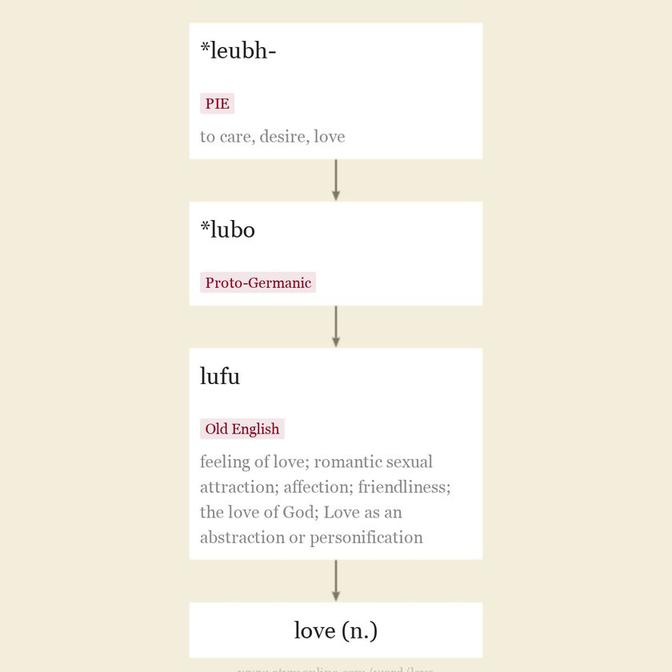lovesome (adj.)
古英语 lufsum “值得爱的”,源自 love(n.)+ -some(1)。早在13世纪就表示“可爱的”,1720年表示“充满爱意的”。这是一个古老的词汇,但在其原始意义上仍然有用。相关词汇: Lovesomely; lovesomeness。
lovesome 的相关词汇

古英语 lufu “爱的感觉; 浪漫的性吸引力; 深情; 友好; 上帝的爱; 爱作为抽象或拟人化的概念”,源自原始日耳曼语 *lubo(也源自古高地德语 liubi “喜悦”,德语 Liebe “爱”; 古诺尔斯语、古弗里斯兰语、荷兰语 lof; 德语 Lob “赞美”; 古撒克逊语 liof 、古弗里斯兰语 liaf 、荷兰语 lief 、古高地德语 liob 、德语 lieb 、哥特语 liufs “亲爱的,心爱的”)。这些日耳曼语词源自 PIE 词根 *leubh- “关心,渴望,爱”。
在古英语中,这个词的含义变弱为“喜欢,钟爱”。意思为“心爱的人”可追溯到13世纪初。在网球等比赛中,“没有得分”的意思可追溯到1742年,源于 playing for love(1670年代)的概念,即没有赌注。短语 for love or money “无论什么”可追溯到1580年代。短语 no love lost(指两个人之间)含义模糊,17世纪用于指两个相爱的人(约1640年)以及两个彼此不喜欢的人(1620年代,通常是现代意义)。
动词 to fall in love 可追溯到15世纪初; to be in love with(某人)可追溯到大约1500年。动词 to make love 在1570年代的意思是“对某人表示爱意”; 作为“发生性关系”的委婉说法,可追溯到大约1950年。短语 Love affair “爱的特殊体验”可追溯到1590年代。短语 Love life “某人的集体爱情活动”可追溯到1919年,最初是心理学术语。短语 Love beads 可追溯到1968年。虚构的昆虫 Love bug 可追溯到1883年。短语 Love-handles “腰部的脂肪”可追溯到1967年。
"Even now," she thought, "almost no one remembers Esteban and Pepita but myself. Camilla alone remembers her Uncle Pio and her son; this woman, her mother. But soon we shall die and all memory of those five will have left the earth, and we ourselves shall be loved for a while and forgotten. But the love will have been enough; all those impulses of love return the love that made them. Even memory is not necessary for love. There is a land of the living and a land of the dead and the bridge is love, the only survival, the only meaning." [Thornton Wilder, "Bridge of San Luis Rey," 1927]
“即使现在,”她想,“几乎没有人记得埃斯特班和佩皮塔,只有我自己记得。卡米拉独自记得她的叔叔皮奥和她的儿子; 这个女人,她的母亲。但很快我们将死去,对这五个人的所有记忆将离开这个世界,我们自己将被爱一段时间然后被遗忘。但是爱已经足够了; 所有那些爱的冲动都回报了使它们产生的爱。即使没有记忆,爱也是不必要的。有一个活着的世界和一个死去的世界,而桥梁就是爱,唯一的生存,唯一的意义。” [索顿·怀尔德,《圣路易斯桥》,1927年]
这是一个词缀,用于从名词或形容词(有时也是动词)中构成形容词,表示“倾向于; 导致; 在相当程度上”,源自古英语 -sum,与 some 相同,源自 PIE 词根 *sem-(1)“一个; 作为一个,与……一起”。同源于古弗里西亚语 -sum,德语 -sam,古诺尔斯语 -samr; 也与 same 相关。
“它通常表示拥有相当程度的所描述的品质:如 mettle some,充满勇气或精神; glad some,非常高兴或欢乐”[世纪词典]。它也是 buxom 中的结尾。对于与数字一起使用的 -some( twosome , foursome 等),请参见 -some(2)。